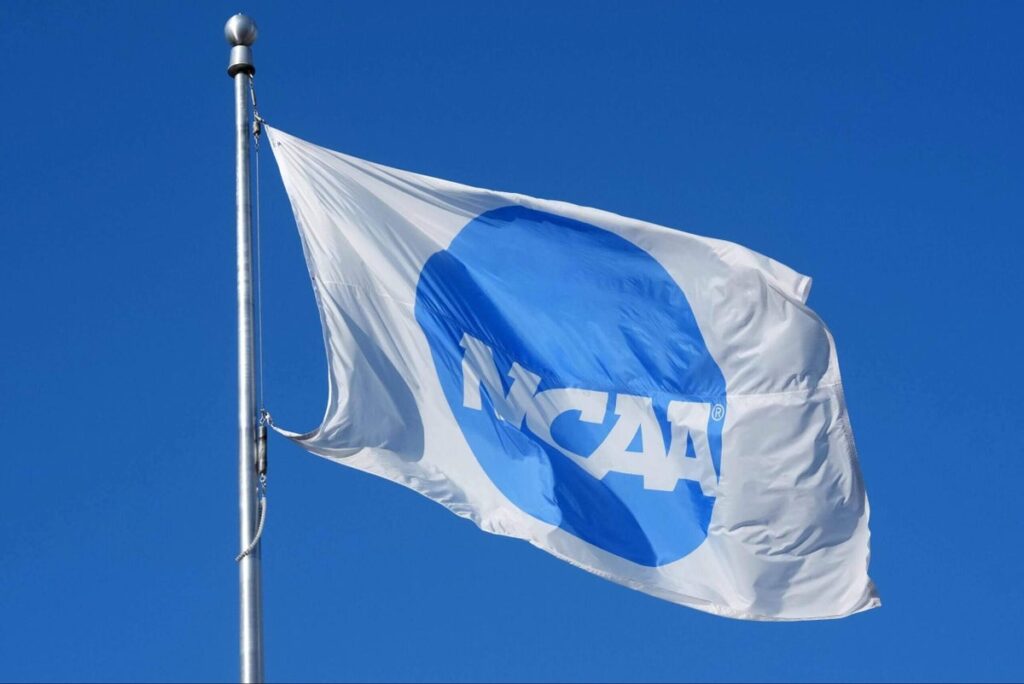A possible change in college eligibility rules to allow athletes five years of competition instead of four will not be implemented in the near future, according to a memo released Wednesday by the NCAA.
What has been dubbed the “five-for-five” rule, allowing athletes to play five seasons without redshirting, has been an oft-discussed topic among college football and basketball coaches, with some saying they expected a change soon.
Wednesday’s memo, sent to Division I schools by Illinois athletic director and Division I Cabinet Chairman Josh Whitman, makes clear that the current eligibility rules — five years to play four seasons — will remain in place for the remainder of this academic year as well as the 2026-27 school year.
“At its October meeting, the Division I Cabinet determined that, for the remainder of the current academic year and for teams competing in the 2026-2027 academic year, it would maintain existing eligibility rules with respect to student-athletes participating in no more than four seasons of competitive athletics in a particular sport in a consecutive five-year period,” Whitman said in the memo, a copy of which was obtained by Athletics. “The Cabinet is studying these policies, as well as several related eligibility rules, and will later consider what changes, if any, to implement for future academic years. When challenged, the current rules have been upheld by the overwhelming majority of courts.”
The NCAA’s eligibility rules have been under legal attack for much of the last year, with more than two dozen lawsuits challenging what counts toward the current standard of five years to play four seasons.
Vanderbilt quarterback Diego Pavia toppled the first domino by claiming in a lawsuit that his time playing in college should not count toward his NCAA eligibility clock. A judge granted Pavia an injunction, and the NCAA responded with a narrow waiver that allowed Pavia and athletes meeting the same specific criteria to play this season.
Although there were internal discussions at the NCAA level more than a year ago about studying eligibility and considering a five-for-five rule, those have been halted, as conferences and the NCAA push for federal legislation that would give them some protection from constant antitrust suits.
Changing the eligibility rules under current conditions would also likely expose the new rules to legal challenges.
Still, several coaches have publicly stated they expect five-for-five to take effect and have advocated for eliminating issues in which players decide to redshirt unexpectedly to preserve a season of eligibility. Oklahoma coach Brent Venables said Tuesday he thinks the five-on-five “has to” happen.
Earlier this season, Nebraska coach Matt Rhule said he had difficulty making redshirt decisions for his roster because he felt like five out of five would happen soon. Texas coach Steve Sarkisian, speaking during the SEC coaches’ teleconference last week, said he supports the five-on-five.
“I think it’s a terrible position to put these players in this position to make these decisions (mid-season),” Sarkisian said. “There’s money involved, there’s revenue sharing, there’s NIL, there’s different factors, and I think it puts agents, family members and student-athletes in a difficult position to make business decisions in the middle of a season.”
College basketball coaches interviewed by Athletics earlier this year at Nike’s annual Peach Jam tournament were divided, with 15 saying they were in favor of five out of five, 10 voting against and four unsure or not responding.
“I think five years makes perfect sense,” one ACC head coach said. “Most students – normal students – now take five years to graduate. So it would make sense, absolutely reasonable, for a student-athlete to also have five years.”
A West Coast Conference head coach who opposed it said, “I think the old model of five years to play four worked so well, and you had that extra year in case they got hurt. The academic aspect was totally lost in all of this. There were guys who got a sixth or seventh year on that many waivers. It’s crazy.”
Whitman sent the memo Wednesday expressing that the DI Cabinet wanted to provide clarification because “the situation for student-athletes, coaches and administrators remains untenable, with rules changing seemingly at a moment’s notice due to a temporary ruling by a single court.” The memo also pleaded for help from Congress to protect eligibility rules and other academic standards. College sports leaders have long pushed for federal help in establishing national standards for schools to navigate since name, image and likeness compensation became permitted in 2021.
“As these situations demonstrate, we need bipartisan legislation that authorizes college sports to establish these ground rules that support academics as the fundamental goal of college athletics,” Whitman said in the memo.

